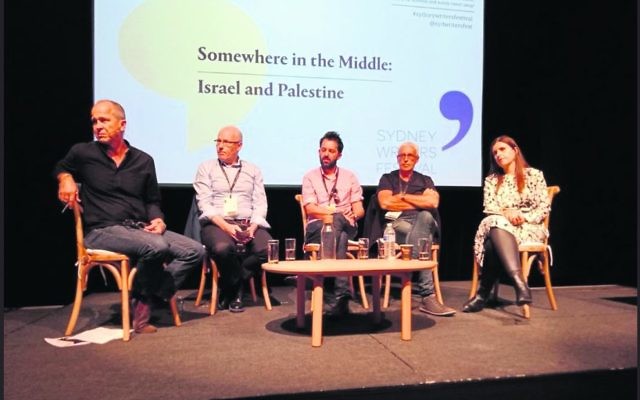Festival session a parody masquerading as debate
No-one suggests every political session at the SWF need comprise an equal number of protagonists advocating competing perspectives; but surely the integrity of the festival demands what on any objective analysis should be a reasonable measure of balance.
ISRAEL is an apartheid state, a colonialist enterprise guilty of carrying out ethnic cleansing against the Palestinian people.
If you wanted to be assailed by such calumnies – these ones damningly unchallenged and uncorrected – all you needed to do was turn up at Carriageworks in the inner city last Friday, the venue for much of the 2018 Sydney Writers Festival (SWF), and attend a session obscurely titled “Somewhere in the Middle: Israel and Palestine”.
The panel, declared the promotional material, would “consider whether, for the first time in decades, a new path to peace can be forged in the Israel–Palestine conflict”.
This seemingly laudable objective would never see the light of day – indeed, could never see the light of day, given the glaringly stacked panel which the SWF, in its wisdom, put together.
In no particular order, there was John Lyons, a former Sydney Morning Herald editor and currently senior investigative editor at the ABC, who spent six years in Israel as The Australian’s correspondent and whose recently-published book Balcony Over Jerusalem unequivocally paints one side of the Israel–Palestine paradigm as inhumane villain, the other as hapless victim.
By way of example, in 367 pages, much of the content demonising Israel, one is hard pressed to find a mention of the relevant fact that Hamas is a genocidal regime whose charter states that Israel will exist until Islam will obliterate it, as it has obliterated others before.
Then we had Randa Abdel-Fattah, an articulate Australian Palestinian writer whose book Where The Streets Had A Name lambastes Israel as vicious colonialist and who peddled the falsehood that its establishment created 750,000 Arab refugees, without acknowledging that the 1947-48 war resulted in an even greater number of Jewish refugees who were expelled from Arab countries.
Her repeated refrain was that Israel is an apartheid and colonialist state and that BDS (the boycott, divestment and sanctions policy) is the best way forward – just as sanctions and boycotts proved effective in ultimately terminating South Africa’s apartheid regime.
If that wasn’t enough of a loaded panel, the SWF thought it a useful idea to also include Anthony Lowenstein, who has made a virtue of being a Jew who demonises Israel and who happily tossed cheap barbs into the fray while making it clear that he is profoundly ashamed of Israel.
And then there was Melbourne academic Mark Baker, who sought to raise the level of the discussion and insert a measure of balance into the proceedings while holding fast to his humanitarian worldview and endorsing criticism of the occupation and of Netanyahu.
In the chair was journalist Peter Greste, who did a fair job challenging the speakers – although it would surely have been relevant to mention the Hamas tunnels designed to abduct and kill Israelis or Hezbollah’s 150,000 missiles and rockets pointed at Israel or Iran’s burgeoning nuclear capabilities in response to panellists derisively scoffing at the suggestion that Israel faces any security threats.
In a bizarre coincidence, the three questions taken from the floor were all from identities who hold positions harshly critical of Israel – Nick Reimer, the academic who orchestrated the recent campaign at the University of Sydney, calling on USYD to cut ties with Israeli institutions; Liam Getreu, executive director of the New Israel Fund, which is about to host the leader of the even more harshly critical Breaking the Silence; and Jews Against the Occupation member Vivienne Porzsolt, whose years of anti-Israel activism include being detained in Israel after she joined a Gaza flotilla along with former Greens MP Sylvia Hale.
No-one suggests every political session at the SWF need comprise an equal number of protagonists advocating competing perspectives; but surely the integrity of the festival – which attracts patrons in the tens of thousands, including from abroad – demands what on any objective analysis should be a reasonable measure of balance, both in the cases being presented and those invited to present them.
Israel is an imperfect democracy, as the best democracies are. And criticism of course goes with the territory.
But there was never so much as a hint during the SWF session that most Israelis are desperate for peace – on the contrary, it was argued repeatedly that most simply don’t care; never a mention of the multiple peace offers which Arafat and Abbas knocked back.
Never a mention of the fundamental refusal by many of Israel’s neighbours to accept a Jewish presence in the Middle East.
What transpired at the Sydney Writers Festival last Friday afternoon was a sorry parody masquerading as intellectual debate.
As such, it was the manifestation of an egregious lack of judgment which reflects poorly on the organisation, on its management and on the festival itself.
VIC ALHADEFF is CEO of the NSW Jewish Board of Deputies. Twitter: @VicAlhadeff


comments